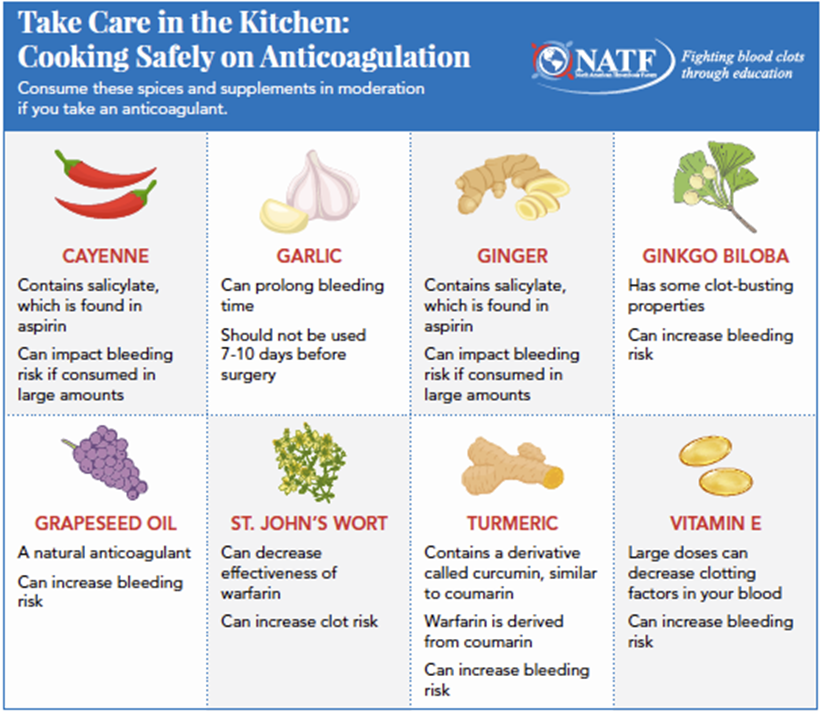The patient is to be started on warfarin (Coumadin) therapy. It is important for the nurse to check for the use of which herbs? (Select All that Apply)
Valerian
Ginkgo biloba
Echinacea
Ginger
Garlic
Correct Answer : B,C,D,E
A. Valerian:
Valerian is an herb commonly used for its sedative and anxiolytic properties. There is limited evidence suggesting potential interactions between valerian and warfarin, but it is not considered a major concern for altering warfarin's anticoagulant effects. However, caution is still warranted, and healthcare providers should monitor patients for any signs of increased bleeding if they are using valerian along with warfarin.
B. Ginkgo biloba:
Ginkgo biloba is an herb often used for its cognitive-enhancing properties and to improve circulation. There is some evidence to suggest that ginkgo biloba may interact with warfarin and increase the risk of bleeding due to its anticoagulant effects. Therefore, patients taking warfarin should use ginkgo biloba cautiously and inform their healthcare providers if they are using it.
C. Echinacea:
Echinacea is an herb commonly used to boost the immune system and treat colds and respiratory infections. Some studies suggest that echinacea may interact with warfarin and potentially increase the risk of bleeding. Therefore, it's essential for patients taking warfarin to avoid or use echinacea cautiously and to inform their healthcare providers if they are using it.
D. Ginger:
Ginger is an herb commonly used for its anti-inflammatory and digestive properties. Some studies suggest that ginger may interact with warfarin and increase the risk of bleeding due to its anticoagulant effects. Patients taking warfarin should use ginger cautiously and inform their healthcare providers if they are using it.
E. Garlic:
Garlic is an herb known for its cardiovascular benefits and potential anticoagulant effects. Some studies suggest that garlic may interact with warfarin and increase the risk of bleeding. Patients taking warfarin should use garlic cautiously and inform their healthcare providers if they are using it.

Nursing Test Bank
Naxlex Comprehensive Predictor Exams
Related Questions
Correct Answer is C
Explanation
A. Take small amounts of food:
This advice suggests eating small, frequent meals when experiencing diarrhea. It aims to reduce the workload on the digestive system and may help alleviate symptoms such as nausea and discomfort. However, while eating small amounts of food can be beneficial, increasing fluid intake is the priority to prevent dehydration associated with diarrhea.
B. Consume large quantities of milk and smoked meat:
Consuming large quantities of milk and smoked meat is not recommended when experiencing diarrhea. Dairy products, including milk, can worsen diarrhea in some individuals, especially those who are lactose intolerant. Similarly, smoked meat may be high in fat and difficult to digest, potentially aggravating gastrointestinal symptoms. Therefore, this advice is not appropriate for managing diarrhea.
C. Increase fluid intake:
Increasing fluid intake is essential when experiencing diarrhea to prevent dehydration. Diarrhea leads to the loss of fluids and electrolytes from the body, which can quickly lead to dehydration if not replenished. Encouraging the patient to drink water, clear broths, oral rehydration solutions, and other electrolyte-rich fluids helps replace lost fluids and maintain hydration levels, making this the correct choice.
D. Take a mild medication to treat the diarrhea along with the ciprofloxacin:
While it may be tempting to take a medication to alleviate diarrhea symptoms, it's crucial to consult a healthcare provider before taking any additional medications, especially when already taking antibiotics like ciprofloxacin. Some anti-diarrheal medications can interfere with the effectiveness of antibiotics or worsen gastrointestinal symptoms. Therefore, it's important to seek medical advice before taking any additional medications.
Correct Answer is B
Explanation
A. Decision to administer either a bactericidal or bacteriostatic drug:
Culture and sensitivity tests provide information about the susceptibility of the microorganism to specific antimicrobial agents. Based on this information, healthcare providers can choose between bactericidal (agents that kill bacteria) or bacteriostatic (agents that inhibit bacterial growth) drugs. For example, if the culture indicates that the microorganism is susceptible to a bactericidal drug, such as penicillin, the healthcare provider may choose to administer that type of drug.
B. Microbial susceptibility to an anti-infective:
This option accurately describes one of the primary purposes of culture and sensitivity tests. These tests determine whether the microorganism causing the infection is susceptible or resistant to specific antimicrobial agents. This information guides the selection of the most appropriate anti-infective therapy to effectively treat the infection.
C. Duration of the antibacterial drug therapy:
While culture and sensitivity tests provide valuable information about microbial susceptibility to antimicrobial agents, they do not specifically determine the duration of antibacterial drug therapy. The duration of therapy is often determined based on factors such as the type and severity of the infection, the patient's response to treatment, and clinical guidelines, rather than solely on the results of culture and sensitivity tests.
D. Decision to administer empiric therapy:
Empiric therapy involves the initiation of antimicrobial treatment based on clinical judgment and knowledge of likely pathogens before culture and sensitivity results are available. Culture and sensitivity tests help confirm the causative microorganism and guide subsequent treatment decisions, including adjustments to therapy based on the results. Therefore, while culture and sensitivity tests inform decisions regarding antimicrobial therapy, they do not directly determine whether empiric therapy should be initiated.
Whether you are a student looking to ace your exams or a practicing nurse seeking to enhance your expertise , our nursing education contents will empower you with the confidence and competence to make a difference in the lives of patients and become a respected leader in the healthcare field.
Visit Naxlex, invest in your future and unlock endless possibilities with our unparalleled nursing education contents today
Report Wrong Answer on the Current Question
Do you disagree with the answer? If yes, what is your expected answer? Explain.
Kindly be descriptive with the issue you are facing.
